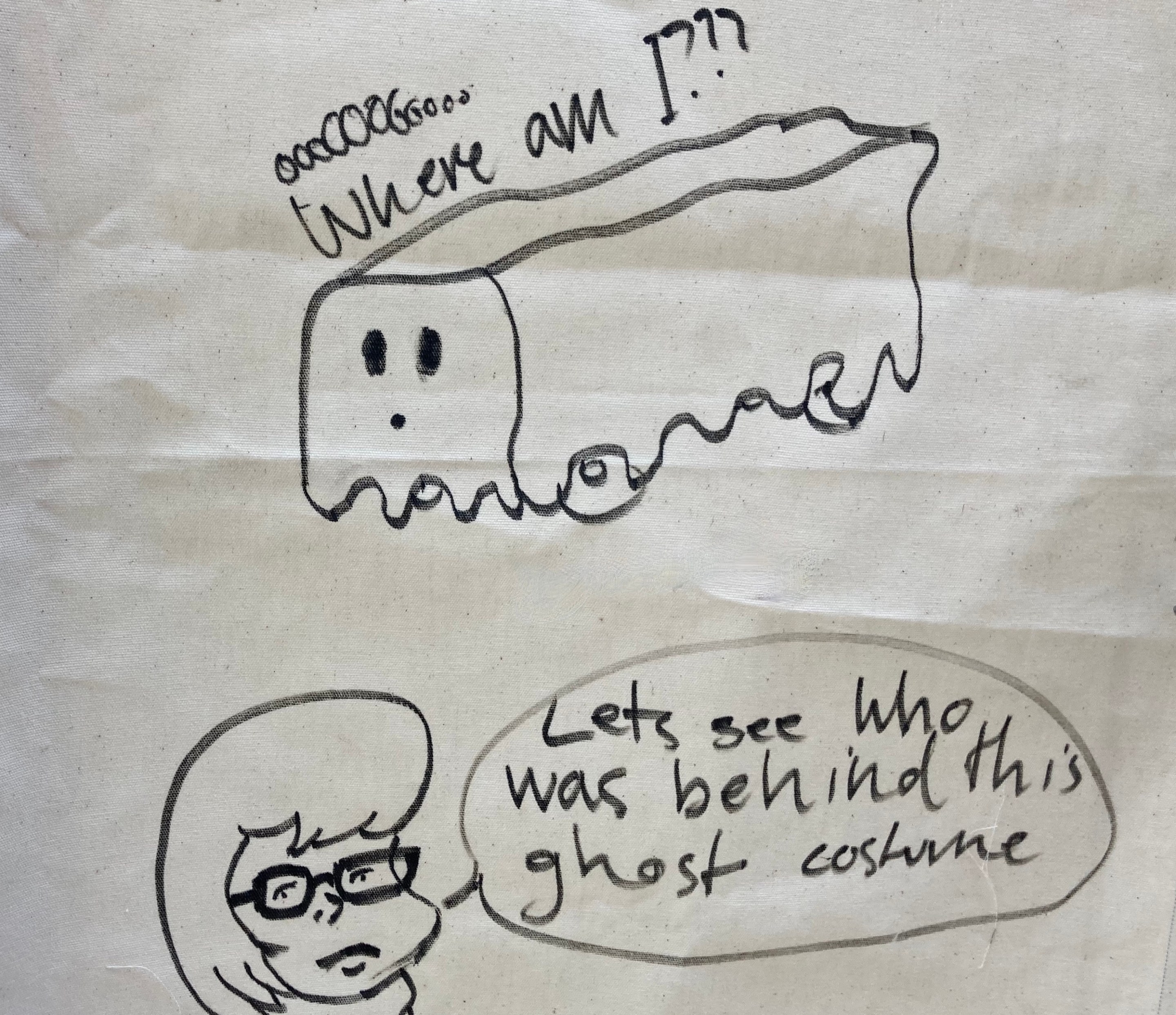Man, this was a busy day for events related to CTA service gaps, caused by pandemic-related staffing shortages, and public safety issues. Here's what happened:
- At 8:30 a.m. Commuters Take Action held the "I'm Late" protest at CTA headquarters, in conjunction with Better Streets Chicago and Chicago Jobs With Justice.
- At 10 a.m. the CTA's monthly board meeting took place.
- At noon Ald. Carlos Ramirez-Rosa (35th) and reps from the transit worker unions, Commuters Take Action, and CWJW held a press conference calling on the CTA to hire more workers and improve reliability.
- And at 1 p.m. the City Council's Committee on Transportation and the Public Way held a long-awaited meeting on improving CTA service.
But the wildest thing that happened today that CTA president Dorval Carter Jr. didn't bother to show up for a City Council hearing at which he should have been the man of the hour. To an outside observer, this seems like an incredibly foolish thing to do, since it angered the very alderpersons who have sway over many Council decisions that impact the CTA, even though the agency is technically governed by its board.
Making this snub doubly inexplicable is that this is the second time this year that Carter conspicuously skipped a City Hall meeting. Last January he was a no-show at a usually routine Budget Committee discussion of sending real estate transfer tax money to the agency. Alders retaliated by holding up the $26.1 million in funding until the president apologized.
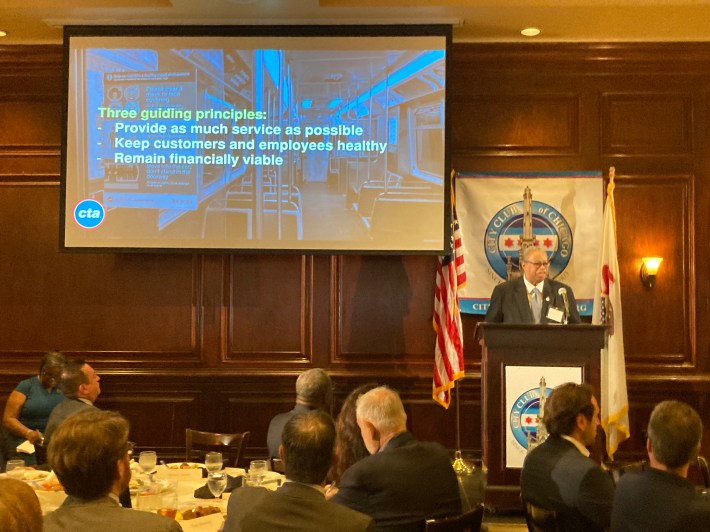
So it was predictable when today's Transportation Committee hearing turned into something of a gripe session. During the public comment period, usually mild-mannered Active Transportation Alliance campaign organizer Robert Schultz III voiced disbelief. "Where is Dorval Carter, the president of the CTA?" he said incredulously.
Schultz noted that the city needs to get serious about creating faster, more reliable bus service. "Finger pointing by CTA and [the Chicago Department of Transportation] should cease... Aldermanic roadblocks to a citywide bus lane network and bus rapid transit must end. Give buses priority over other traffic."
Schultz also argued that "The CTA must be transparent about public transportation security contracts, currently totally over $100 million." He noted that there was little or no public input on these expenditures, and data wasn't been provided to citizens suggesting that these strategies, including more unarmed security guards and dog patrols, would be effective.
Next the CTA's chief innovation officer Molly Poppe and other staffers presented on the transit system's recent challenges and strategies to overcome them. She said that in 2019 the CTA had 9,986 union employees, but by mid-August 2021 they only had 8,908.
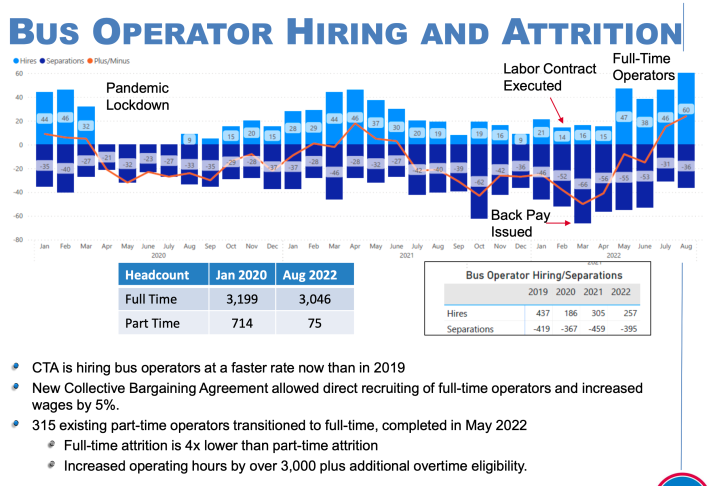
As for crime, Poppe argued that "Safety issues in our neighborhoods inevitably spill onto CTA." She acknowledged that recent surveys have found that CTA customers are much less satisfied with service and public safety than before the pandemic. But she added that in August the agency released its new plan "Meeting the Moment: Transforming CTA’s Post-Pandemic Future in an effort to address these problems.
CTA chief administrative officer Todd McKone discussed hiring practices. He noted that a new collective bargaining agreement was approved in February, including raises and retroactive hazard pay, and said the number of new hires has recently tripled.
Next Hoppe discussed the CTA's service optimization efforts, tweaking its schedules to better reflect the available workforce and concentrating service where it is most needed, with an emphasis on transit-dependent riders. In a news release today, the agency said this strategy, launched in mid-August, has already reduced service gaps on the Red and Blue lines.
The CTA's vice president for security Kevin Ryan reported on safety efforts, touting the increased number of security personnel in the system. He also mentioned new infrastructure meant to deter crime, such as taller entry gates to deter "fare theft."
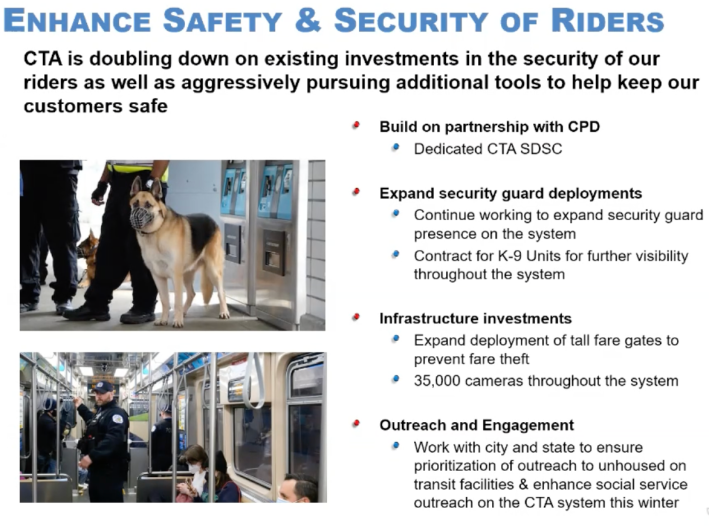
After that Hoppe discussed efforts to improve rider experience such as cleaning protocols; the Refresh and Renew program for short-term station upgrades; and the systems new electric buses and 7000 series cars.
Next she talked about upgrades to the Transit Tracker apps, and plans to roll out a new CTA chatbot feature so that customers can ask questions and get useful automated responses.
The CTA's chief transit officer Donald Bonds discussed workforce issues, including improving conditions at employee facilities, better safety barriers for bus drivers during a time of more frequent assaults on operators, and providing customer assistants with upgraded video screens to monitor stations.
Finally Hoppe discussed the new Ask CTA program, with managers doing outreach to customers at stations. She concluded that the Meeting the Moment plan is about "responding on the frustrations that [customers] have" and building on the system's strong points.
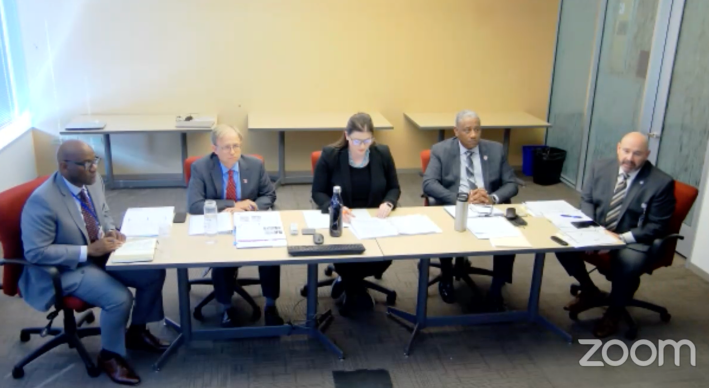
After that, alders were given a chance to ask the CTA staff questions. Ald. Michael Rodriguez (22nd) asked Ryan whether as part of the security contracts, the firms are required to provide deescalation training to their guards and, if so, how the CTA ensures that's actually happening. Ryan responded that the agency checks the security firms' training syllabi, adding that the CTA has a third-party auditor doing field work observing the guards.
Next Rodriguez brought up the aggravating "ghost" run problem, when buses and trains appear on Transit Tracker screens only to evaporate before arrival. "That would piss anybody off. It creates anxiety and tension, and a lot more calls to our office." Hoppe responded that service optimization and hiring will help make ghost buses and trains less common.
Ald. Andre Vasquez (40th) asked why Carter wasn't there. Hoppe said the CTA staff were there to represent him.
"That didn't answer the question," Vasquez responded. "Is he ghosting us?"
"President Carter takes CTA service very seriously," Hoppe assured him.
"If he was taking it seriously he would be here," Vasquez fired back. "That's a disrespect to the Council, and to the ridership, and to the workers."
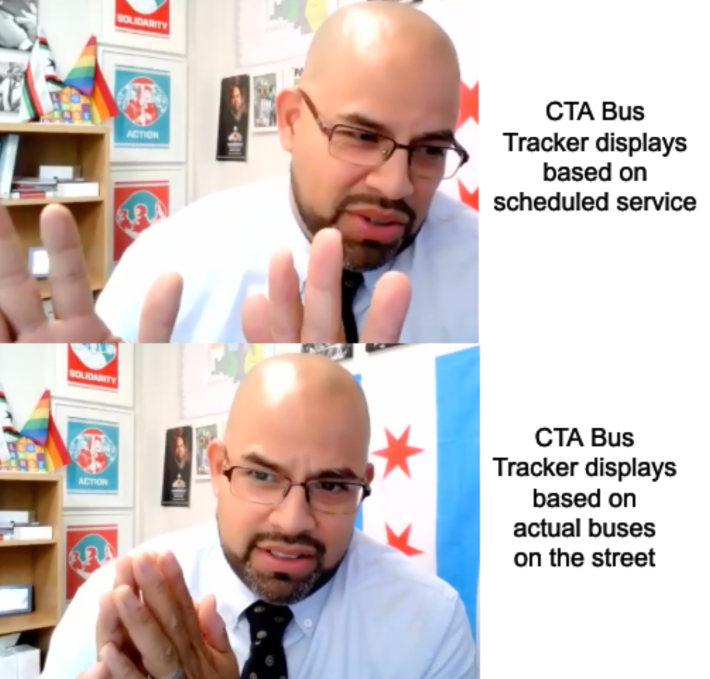
Next Vasquez asked why the CTA doesn't fix the ghost run problem by only showing buses and trains that actually exist, rather than also showing runs that are scheduled, but may be mere phantoms. "Why not temporarily, until you staff up, keeping the Transit Tracker to only real-time info?"
Haute replied that the purpose of showing scheduled runs is to help people plan trips. The alder responded, "Sometimes it's best to simply be real with the public."
CTA: “Here’s a fictional bus schedule to help you plan your day.”
— John Leo (@lee_mueller) September 14, 2022
Ald. Jeanette Taylor (20th) argued that Carter's disrespect of the Council would come back to haunt him the next time he needs a favor from alderpersons.
Taylor also discusses the current availability of federal infra funds. "We're never going to get this kind of money ever again... You all need to be meeting with the community to ask about what kind of infrastructure is needed." She added that some stations in her ward have problems with malfunctioning elevators.
Ramirez-Rosa, the alder who originally called for the hearing, said "I'm scared, I'm worried about a death spiral," in which service continues to decline and ridership drops further, leading to lost revenue and more service cuts. "What needs to happen right now is CTA needs to hire, hire, hire." He said that while he understands the CTA is adjusting schedules to better reflect the amount of staffing available, he hopes the current low-frequency service won't become permanent.
Near the end of the meeting, Ald. Matt Martin (47th) once again asked Hoppe why the agency refuses to simply use real-time data for the Trackers, so that customers can be confident that buses and trains on the screens will actually show up. Hoppe reiterated the CTA party line that once the schedule aligns with staffing, the Trackers will be accurate.
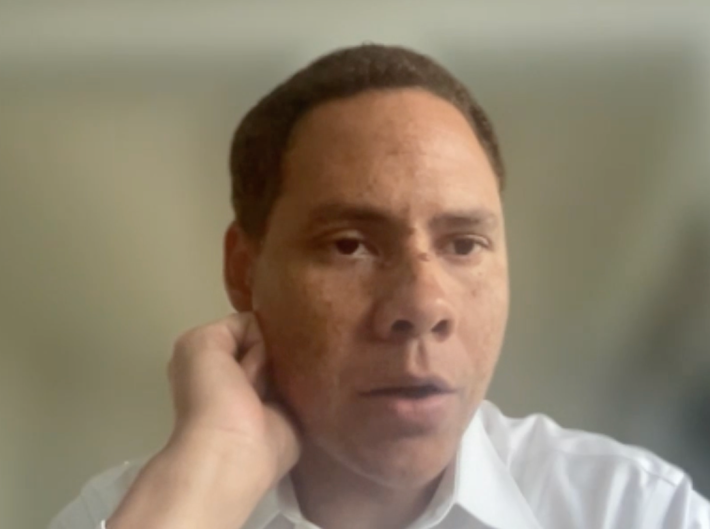
"Dumb it down for me," Martin pleaded. "If CTA knows a run is a ghost run, why is it shown on the Tracker?" The real answer seems to be that the agency is embarrassed to admit to customers just how long the waits can be between actual buses and trains.
After repeated questioning, Martin got Hoppe to give him a ballpark estimate of when the Trackers will improve. "Within a year we want to see significant improvements," she said.
Alderpersons and CTA customers shouldn't be satisfied with that answer. And we shouldn't tolerate a CTA president who can't even be bothered to provide an excuse for why he didn't show up for his own hearing.
